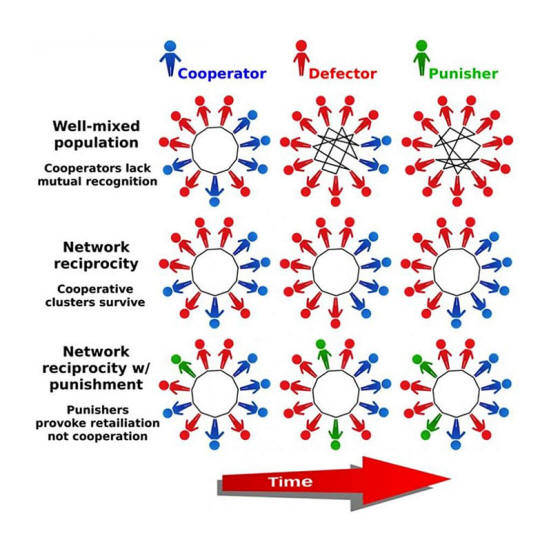|
by Joe Battaglia
January
8, 2018
For example children who are spanked over the long term tend to be more difficult and noncompliant, have various behavior problems, can develop anxiety disorders or depression, and later develop antisocial behavior.
A game to study human
behavior has shown punishment is an ineffective means for promoting
cooperation among players.
Children
universally seek to understand their world through the love and
nurturing comfort of care-givers,
not physical pain by consequence of
misbehaving.
Does the benefit of cooperation outweigh the total cost of cooperating with all neighbors?
Human societies maintain their stability by forming cooperative partnerships. But, cooperation often comes at a cost.
For example, a person taking time to raise the alarm in order to alert other members of a group to impending danger could be losing valuable time to save oneself. It is unclear why natural selection favors cooperativeness among individuals who are inherently selfish.
In theoretical studies, punishment is often seen as a means to coerce people into being more cooperative.
To examine such theory, a team of international researchers led by Marko Jusup of Hokkaido University in Japan and Zhen Wang of Northwestern Polytechnical University in China has conducted a "social dilemma experiment."
The team investigated if providing punishment as an option helps improve the overall level of cooperation in an unchanging network of individuals.
They used a version of the commonly employed "prisoner's dilemma" game.
Two hundred and twenty-five students in China were organized into three trial groups and played 50 rounds each of the game.
At the end of the game, overall points were counted and the students were given monetary compensation based on the number of points won.
The expectation is that, as individuals play more with the same opponents over several rounds, they see the benefit of cooperating in order to gain more points.
Introducing punishment as an option is basically saying:
In theory, it is expected that applying this option would lead to more cooperation.
The researchers found that players in the constantly changing groups cooperated much less (4%) than those in the static groups (38%), where they were able to establish which players were willing to cooperate and thus gain a larger average financial payoff for all involved.
Surprisingly, however, adding punishment as an option did not improve the level of cooperation (37%).
The final financial payoffs in this trial group were also, on average, significantly less than those gained by players in the static group.
Interestingly, less defection was seen in the punishment group when compared to the static group; some players replaced defection with punishment.
Punishment seems to have an overall demoralizing effect, as individuals who get punished on multiple occasions may see a good chunk of their total payoff vanish in a short period of time, explain the researchers.
This could lead players to lose interest in the game and play the remaining rounds with less of a rational strategy. The availability of punishment as an option also seems to reduce the incentive to choose cooperation over competition.
Why, then, is punishment so pervasive in human societies?
Although the study provides valuable insights into how cooperation arises in human society, the team advises it would be unwise to extrapolate the implications of their study far beyond the experimental setting.
|


